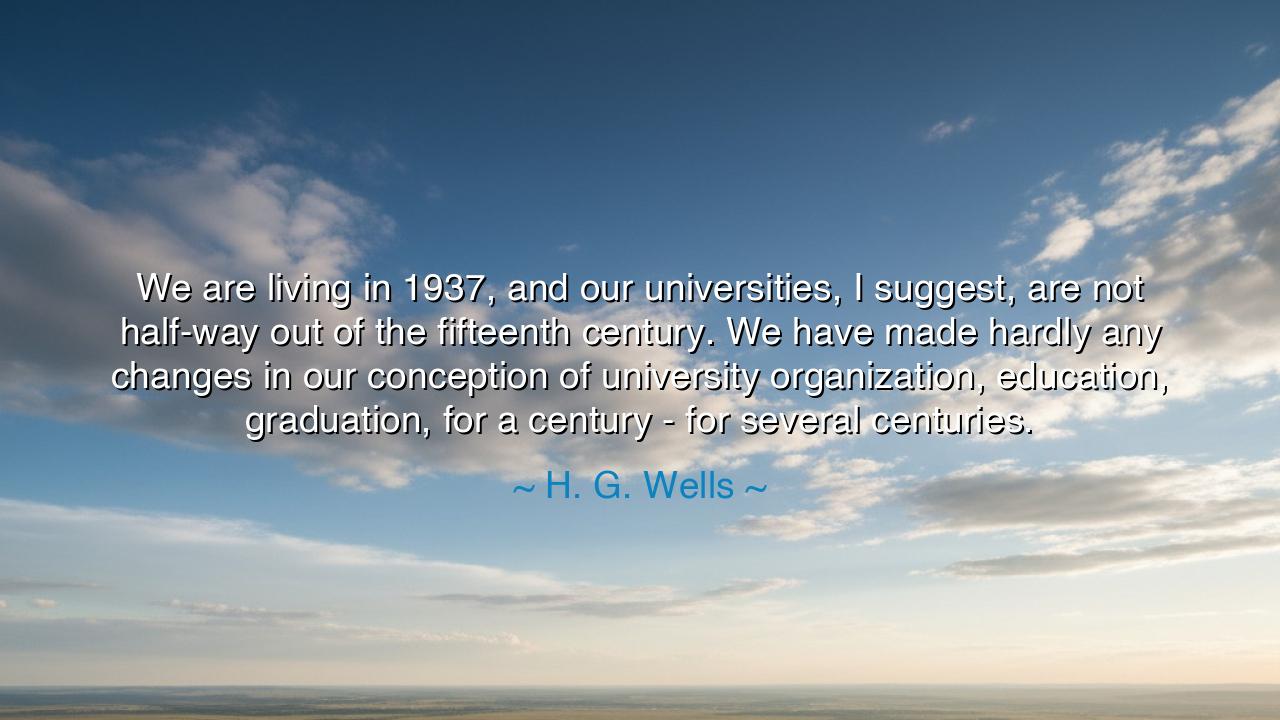
We are living in 1937, and our universities, I suggest, are not
We are living in 1937, and our universities, I suggest, are not half-way out of the fifteenth century. We have made hardly any changes in our conception of university organization, education, graduation, for a century - for several centuries.






Hear, O seeker of knowledge, the thunderous insight of H. G. Wells, the prophet of modern imagination and architect of thought, who once declared: “We are living in 1937, and our universities, I suggest, are not half-way out of the fifteenth century. We have made hardly any changes in our conception of university organization, education, graduation, for a century — for several centuries.” Though spoken in another age, these words still strike like a bell in our own — for they reveal the eternal struggle between progress and tradition, between the living mind and the dusty halls of habit. Wells, ever the herald of the future, saw with piercing clarity that education, the fountain of civilization, had grown stagnant, content with the echoes of the past while the world raced toward new horizons.
The meaning of this quote burns with urgency. Wells warns that the great institutions of learning — the universities — have failed to evolve alongside the very civilizations they helped create. While humanity had entered an age of machinery, science, and global transformation, the universities remained bound to the structures and assumptions of the fifteenth century — a time of kings and clerics, when knowledge was the privilege of a few and wisdom was chained by dogma. The graduation ceremony, the curriculum, the rigid hierarchies of academia — all were relics of a medieval order pretending to serve a modern world. Wells saw that this failure to renew the spirit of education was not merely an academic flaw, but a moral danger, for it meant that the institutions meant to prepare the mind for the future were, instead, imprisoning it in the past.
The origin of these words lies in the great transformation of Wells’ own century — an age of invention and catastrophe. The year 1937 stood at the shadowed edge of history, between the ruins of one world war and the gathering storm of another. The air hummed with new discoveries — radio, flight, the atom — and yet, in the lecture halls of the learned, the same methods, the same hierarchies, the same lifeless repetition endured. Wells, who had dreamed of worlds beyond, saw in this contradiction a tragedy: humanity’s machines had advanced, but its minds had not. The institutions built to forge visionaries were still producing servants of convention. His call was not against knowledge, but against complacency — a plea that education should evolve as swiftly as the age it sought to serve.
Consider, O listener, the story of Galileo Galilei, who in the seventeenth century stood before the might of the university and the church to proclaim that the Earth moves around the Sun. The universities of his time, like those Wells condemned, clung to old doctrines, fearing the collapse of order more than the birth of truth. They silenced Galileo, yet history vindicated him — and revealed the danger of institutions that mistake preservation for progress. Wells’ lament echoes the same warning: when knowledge becomes a monument instead of a movement, it ceases to enlighten and begins to decay. The mind must not bow before tradition; it must rise to meet the dawn.
H. G. Wells himself was a creature of learning who rebelled against its limitations. Born of modest means, he climbed into scholarship through relentless curiosity, studying science under T. H. Huxley, the fierce defender of Darwin’s evolution. Yet even in the scientific world, Wells saw the prison of narrow specialization, the absence of imagination, the lack of vision. He called for a new kind of education — one that united the sciences and the humanities, that taught not only how to build but why to build, that nourished both intellect and conscience. In his eyes, the purpose of education was not to produce graduates, but creators — minds capable of reshaping the world rather than serving its old designs.
The lesson here is both timeless and urgent: that learning must evolve, or it will perish. Knowledge must not be preserved like a relic, but renewed like a flame. The true university is not a place, but a process — the living conversation between past and future, between the known and the yet-to-be-discovered. To cling to the forms of old, to mistake ceremony for understanding, is to betray the very purpose of learning. Education must be a revolution, not a ritual; a journey of awakening, not a march toward conformity.
So take this wisdom, O reader, and carry it into your life: let your mind never grow content with the comforts of tradition. Question what is handed to you, even when it comes cloaked in authority. Seek learning that transforms, not merely informs. If the universities of the world have grown old in spirit, then become a university within yourself — a place where ideas live, challenge, and renew one another. For the world needs not graduates of the fifteenth century, but thinkers of the future — visionaries who, like H. G. Wells, dare to dream of a civilization always becoming, never merely remembering.
Let us then heed his call. Let every mind that studies, every teacher that teaches, every institution that stands for learning, awaken to the truth that the purpose of education is not to preserve what was, but to prepare what will be. Only then will we truly emerge from the shadows of the past into the radiant dawn of human possibility.






AAdministratorAdministrator
Welcome, honored guests. Please leave a comment, we will respond soon